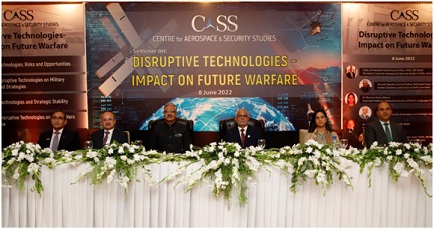ISLAMABAD, June 10: Pakistan needs to harness emerging technologies to strengthen national security and national sovereignty. This was the key message of former senior military officers and eminent intellectuals at the seminar on ‘Disruptive Technologies – Impact on Future Warfare’ organised by the Centre for Aerospace & Security Studies (CASS) in Islamabad. General ZubairMehmood Hayat (Retd), Former Chairman Joint Chiefs of Staff Committee was the Keynote Speaker, while other eminent speakers included Dr Rizwana Karim Abbasi, Associate Professor, National University of Modern Languages (NUML); DrAdil Sultan, Acting Dean, Faculty of Aerospace and Strategic Studies (FASS), Air University; and Air Vice Marshal Faaiz Amir (Retd), Former Vice Chancellor, Air University. The seminar was chaired by President CASS Air Marshal FarhatHussain Khan (Retd), while Air Marshal M AshfaqueArain (Retd), Advisor to Chief of the Air Staff on CASS Affairs moderated the proceedings. Air Marshal AshfaqueArain (Retd), while delivering the Opening Remarks, highlighted that new technologies offered enormous opportunities for civilian as well as defence sectors, but also presented new vulnerabilities and security challenges. While analysing the role of state actors and non-state actors, he cautioned that the latter had greater prospects of exploiting many of the easily accessible technologies in inventive and disruptive ways. They also provided opportunities to smaller states to offset military asymmetry. He further noted that in the endeavour to stay ahead, rapid technological advancements had resulted in increasingly intense technological competition and rivalry between states. Looking at the impact of these changes on Pakistan, he urged that it was important to stay abreast of such technological advancements and how they would affect military doctrines and strategy in the future. This was especially important in case of nuclear-armed adversaries with unresolved disputes, mutual distrust, and shared borders, significantly reducing reaction time, he said. In his Keynote Address, General ZubairMehmood Hayat outlined how disruptive technologies had now become a new toolkit in the hands of policymakers and in his assessment, their greatest impact would be in the political domain as they would disturb the existing balance of power. He explained that such technologies would not only impact the military but also the economy significantly. On the military side, all three traditional domains would be impacted to the extent that the character of the war was likely to be changed fundamentally, the General said. He warned how Artificial Intelligence, if left unbridled, could threaten the very existence of mankind. General Hayat recommended that as a nation, Pakistan needed to be part of the debate and process to ensure human control over these technologies. ‘Disruptive technology is likely to create technical apartheids. We, therefore, need to harness it as a catalyst of change to strengthen our national security and national sovereignty,’ he concluded. DrRizwana Karim Abbasi underlined that disruptive technologies could erode the foundation of ‘Deterrence Theory’, thereby undermining nuclear strategic stability through its effect on nuclear second-strike capability, including C4ISR and force postures. In her assessment, new technologies could contribute to accidental or inadvertent nuclear escalation by threatening dual use of C2 assets in space and cyber space by squeezing the reaction time of decisionmakers. She stressed that Confidence Building Measures across the nuclear spectrum were important, and urged that states developing hypersonic weapons should be encouraged to keep their nuclear and conventional delivery vehicles separate, distinguish clearly between tactical and strategic applications and increase the time to launch them where possible. DrAbbasi also recommended that an international agreement on the known deployment of hypersonic weapons and ban on autonomous nuclear-armed delivery systems as well a moratorium on targeting nuclear command and control systems, was a need of the hour. While analysing the defence and security dimensions of specific disruptive technologies, Air Vice Marshal Faaiz Amir (Retd) highlighted that extensive use of space, using satellites, had become crucial to modern warfare and ‘no nation should expect to win a battle without support from space.’ – PR
- Latest
- Trending





